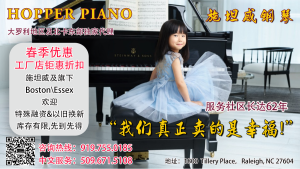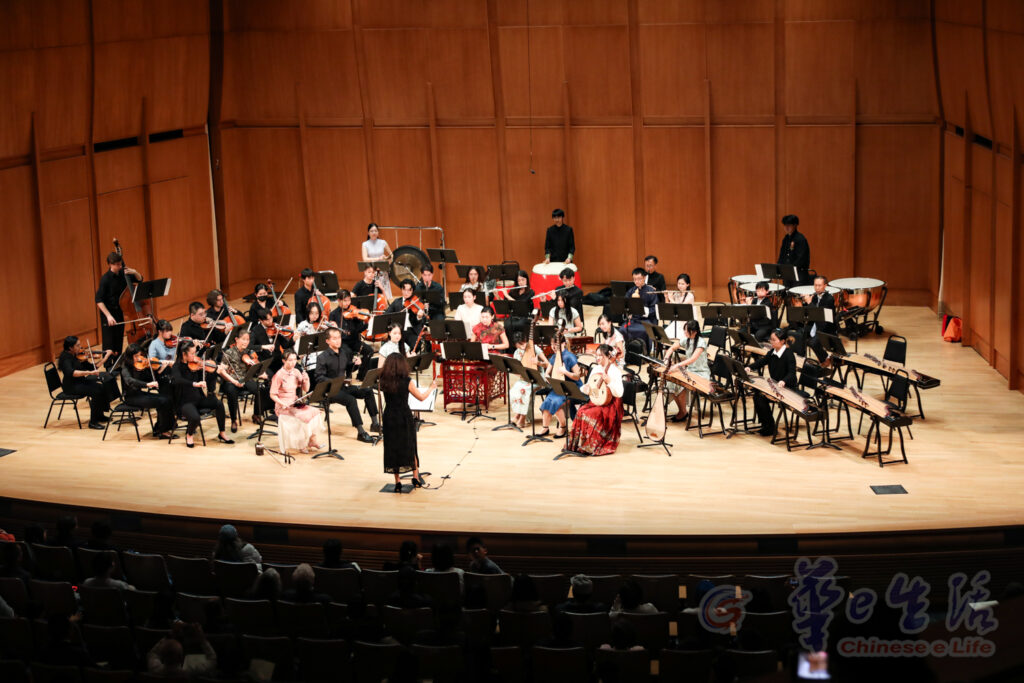
【华e生活】3位华二代小记者,演出结束后找到后台,围住音乐会的操盘手常筱峥问她感觉如何,被她的回答惊到了——
不满意。永远不满意。从来没有满意过。
“我跟学生说,艺术没有最好只有更好。”常筱峥解释。
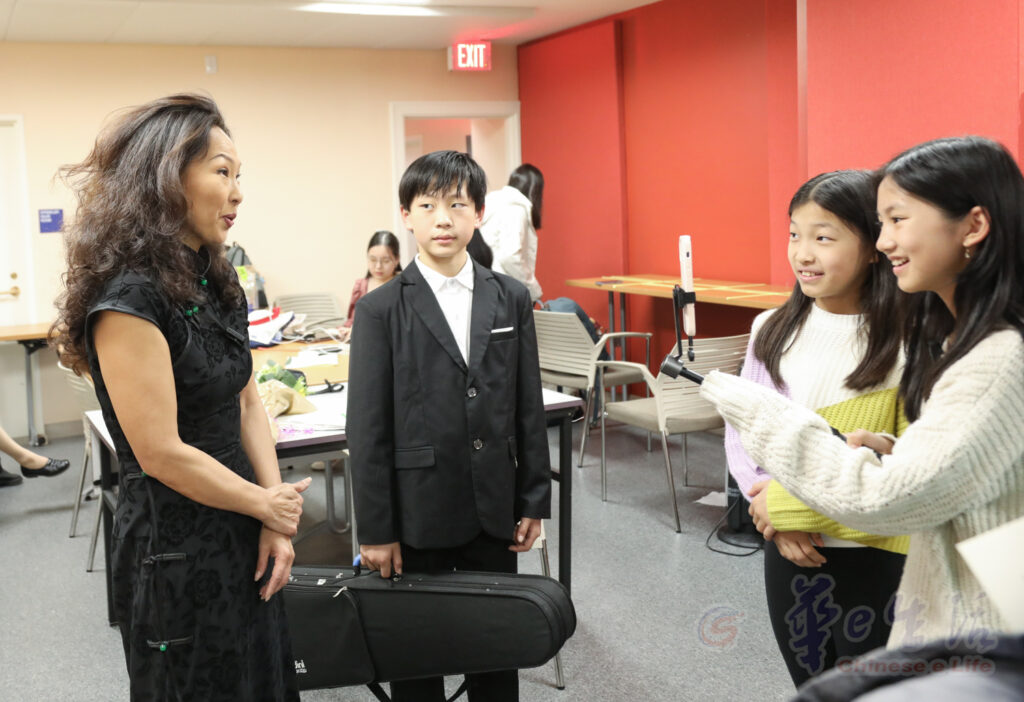
小记者听出了意味,哈哈笑起来,释然。因为,从她们自己的感受,到现场阵阵热烈掌声,表达的效果,正如一位“老美”大叔说“每一首都好听”。
这是11月16日晚在Baldwin音乐厅上演的《中国音乐合奏课秋季音乐会》。是一堂课,也是一台有质量有规模的音乐会。任课老师、华人社区熟悉的古筝演奏家常筱峥,道出了与前几年每年两次都不一样的地方——
添加了定音鼓等乐器,第一次有了民乐管弦乐团的规模演奏脍炙人口的《瑶族舞曲》了;
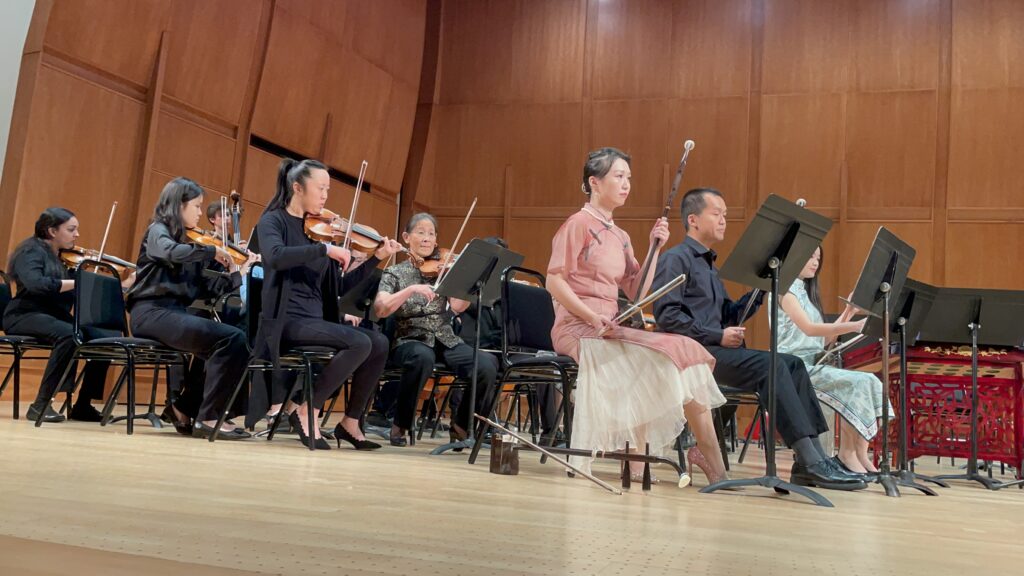
邀请到去年从外州搬到北卡的高胡演奏家倪媛,和专业扬琴演奏家孙晓囡等一起合奏,美不胜收;
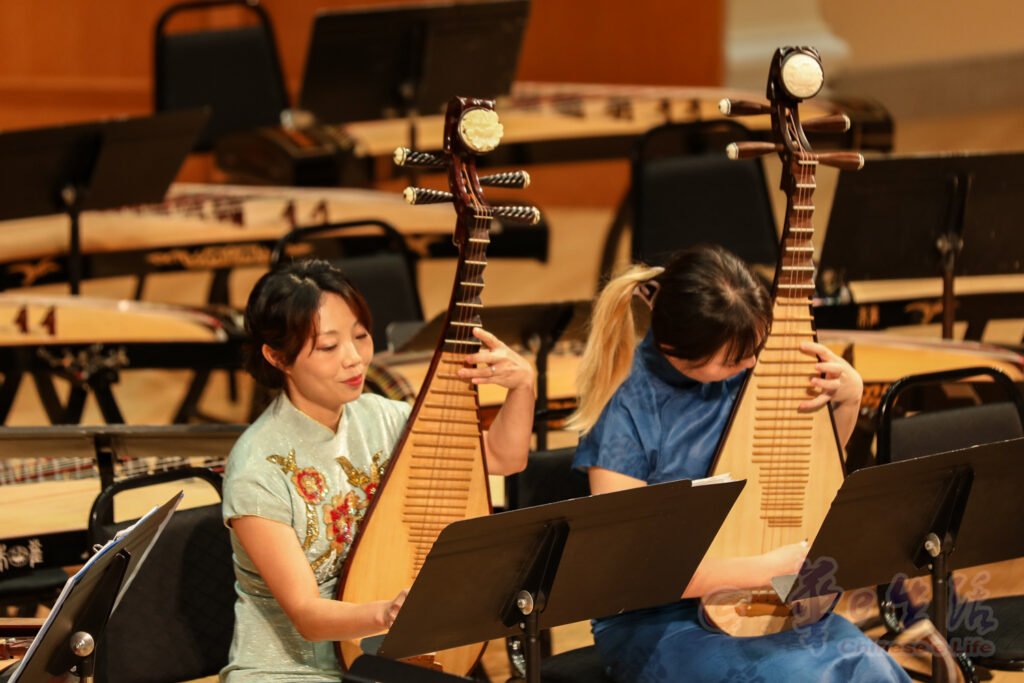
第一次请来Lisa (Qi) (上图左)弹唱苏州评弹表演经典名曲《姑苏行》,年龄最小的演员唐子傅(Tedd)出色完成清脆高亢的竹笛乐段;
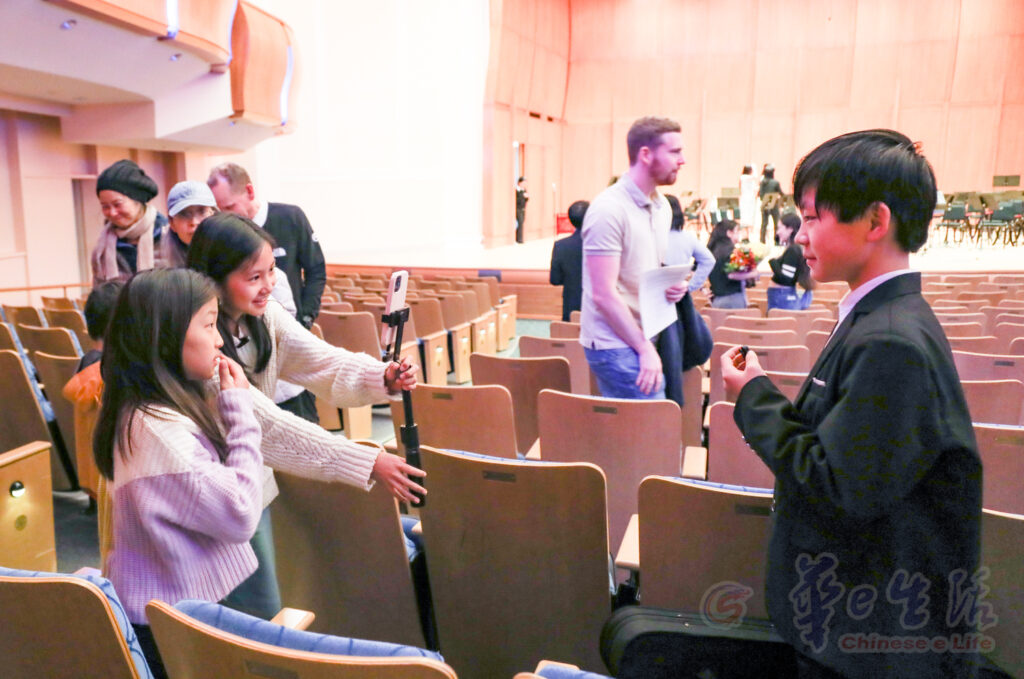
杜克大学音乐教授、小提琴演奏家顾晓梅,现场介绍《良宵》的作曲刘天华,略微拓展了一下背景知识:刘天华和刘半农是同胞弟弟……
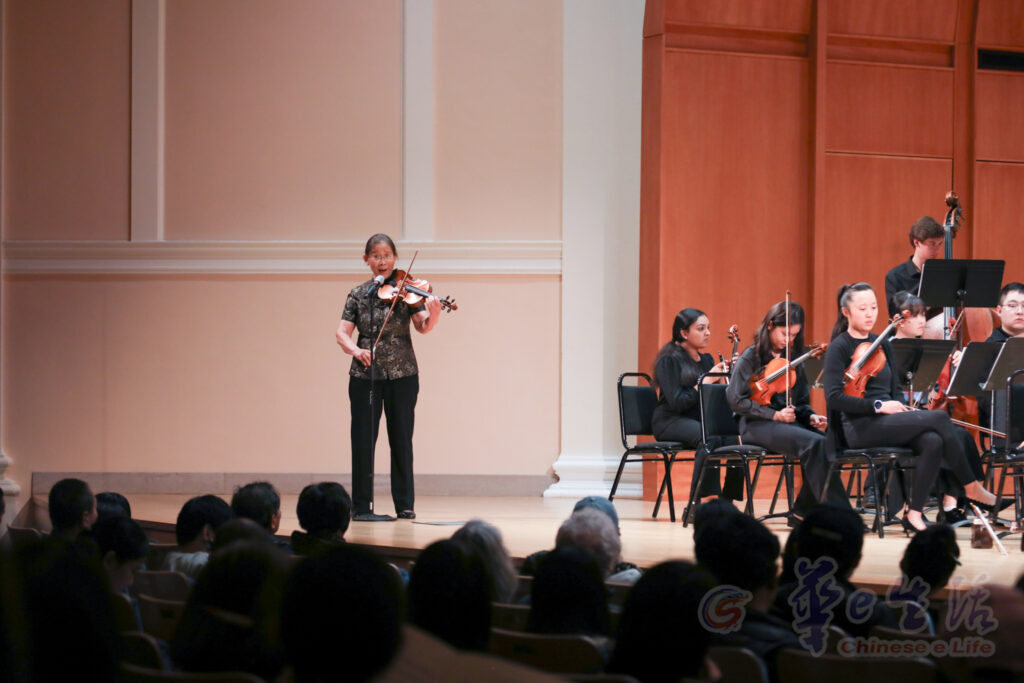
被问起这台演出最为惹眼的乐器——演奏《鸭子拌嘴》的一名演员敲打的一口平底锅,似乎点到了常筱峥的“痛处”——“那口锅是我家的。”“我想向华人社区呼吁,我们我们缺经费、缺人手、缺乐器……”
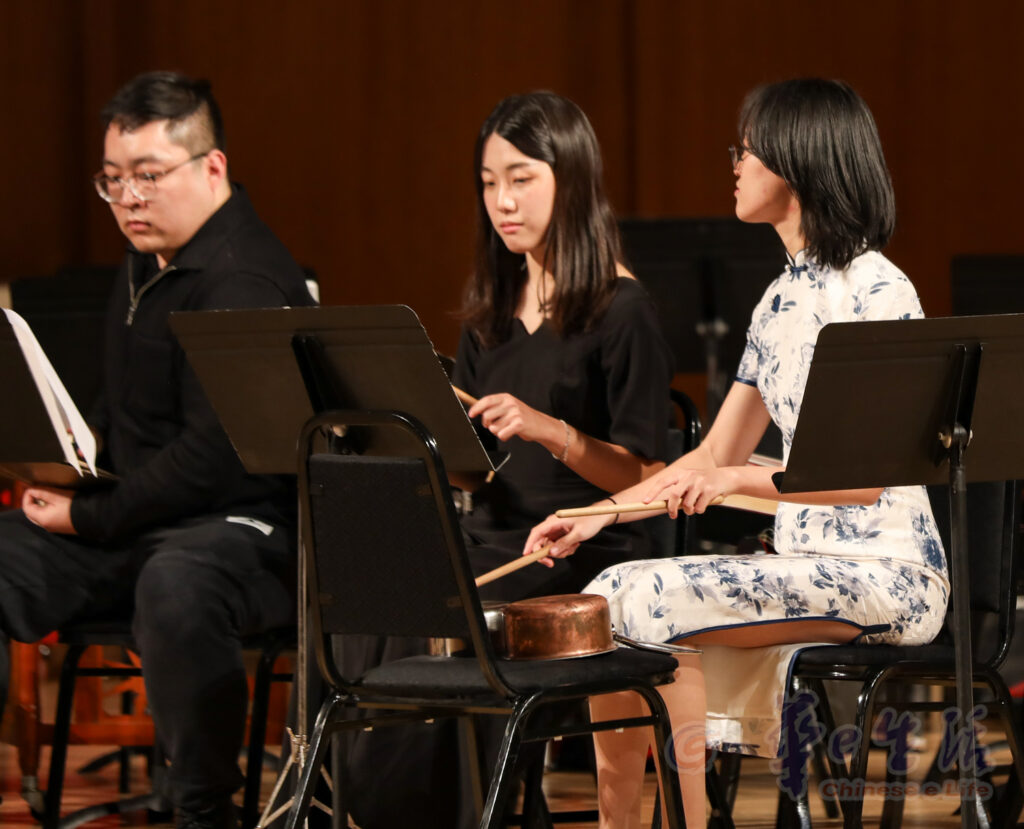
当然,最缺的,永远缺的是人——有一定演奏水准、给这个舞台带来惊喜的各路高手……
音乐会规模升级、参演人数增加、曲目编排多变,意味着精力上的更多投入和消耗。
几个星期没有睡好觉的常筱峥,唯恐不周到没有好好感谢为这次音乐会默默奉献的演员和朋友。
她重申:这是她开设的课程,不是成员固定、独立的乐团,希望华人社区有才华的朋友加入,一起来创作、切磋;明年春季音乐会吉日良时已定,欢迎大家再来观看。
华二代Ailce Zheng如初生牛犊访谈顾晓梅教授。顾教授的那种和善、关爱溢于言表。
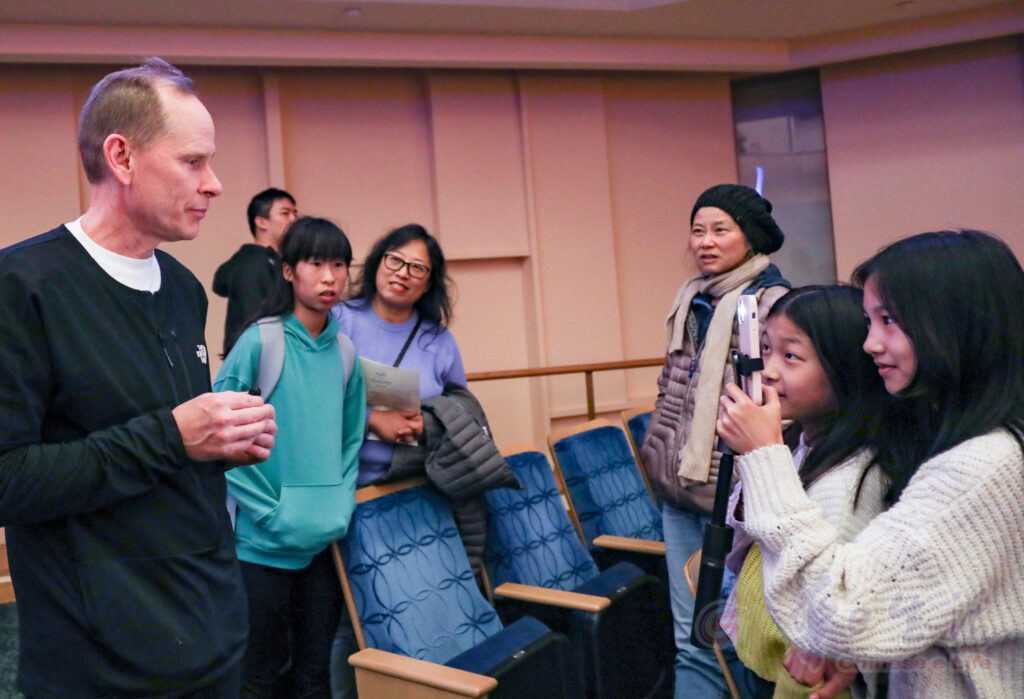
来自凯瑞的Celia 陈语砚第一次当尝试当记者,写出第一篇现场报道。
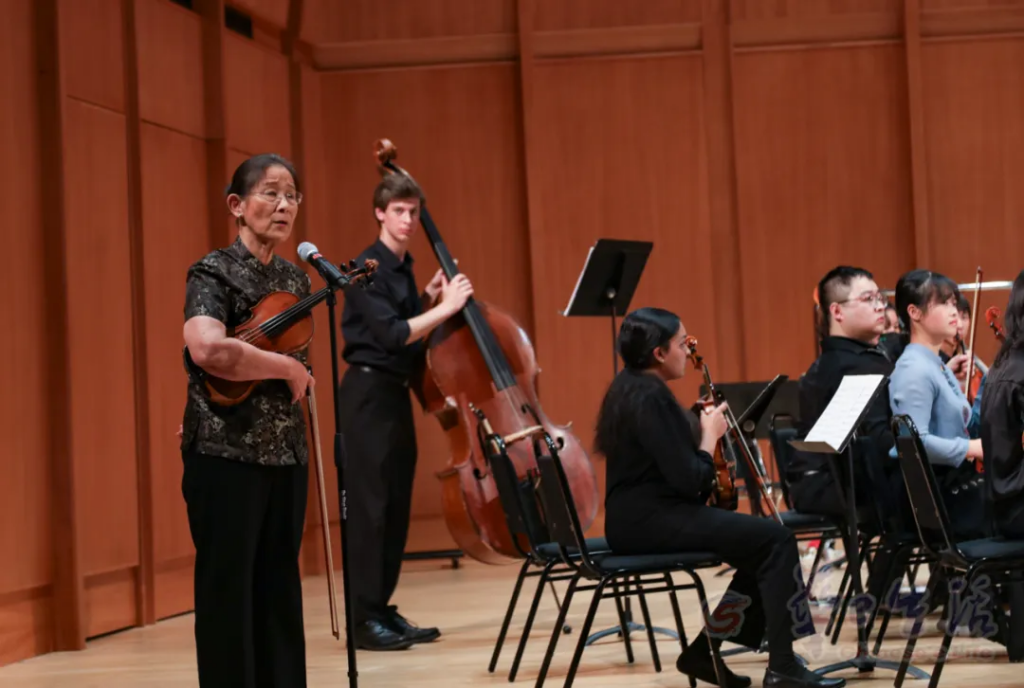
华二代Ailce Zheng如初生牛犊访谈顾晓梅教授。顾教授的和善、关爱溢于言表。
Interview with Professor Hsiao-Mei Ku at Duke Chinese Music Ensemble Concert:
Professor Hsiao-Mei Ku is a talented violinist, she teaches at Duke as a Professor of the Practice of Music and has performed numerous solos and chamber music. She plays classical music and produces beautiful sounds with her violin.
She was one of the performers at Duke Chinese Music Ensemble Concert on November 16th, 2024. Professor Ku was also one of the announcers for the next song. She has been playing all her life starting at the age of 6. Hsiao-Mei Ku is very experienced and plays music from 300 years ago to all the way to the present day, she plays songs from a lot of different composers allowing diverse songs.
During the interview she said that she wants the audience to enjoy the music and see if the music really speaks to their heart.
She was one of the announcers at the show and not only did she announce the next piece, but she also told the audience about her personal connection with another famous musician, who apparently served as a best man in her parent’s wedding. She then demonstrated how she was going to try to make the music imitate how previous instruments of the piece sounded and gave a quick demonstration of how different types of people from different places will play differently.
杜克民乐合奏音乐会之顾晓梅教授专访:
顾晓梅教授是一位才华横溢的小提琴家,她在杜克大学任教,担任音乐实践教授,并演奏过许多独奏和室内乐。她演奏古典音乐并用小提琴发出优美的声音。
她是2024年11月16日杜克大学中国音乐合奏课的表演者之一。顾教授也是下一首歌曲的报幕员之一。她从6岁开始就一直在演奏,经验丰富,演奏的音乐从300年前一直到今天。她演奏的歌曲来自很多不同的作曲家,让歌曲多样化。
她在采访中表示,希望观众能够享受音乐,看看音乐是否真的说到了他们的心里。
她是演出的报幕员之一,不仅宣布了下一首作品,还向观众讲述了她与另一位著名音乐家的个人关系,这位音乐家居然是她父母婚礼上的伴郎。然后,她演示了如何尝试让音乐模仿这首曲子之前的乐器的声音,并快速演示了来自不同地方的不同类型的人如何以不同的方式演奏。来自凯瑞的Celia 陈语砚第一次尝试当记者,写出第一篇现场报道。
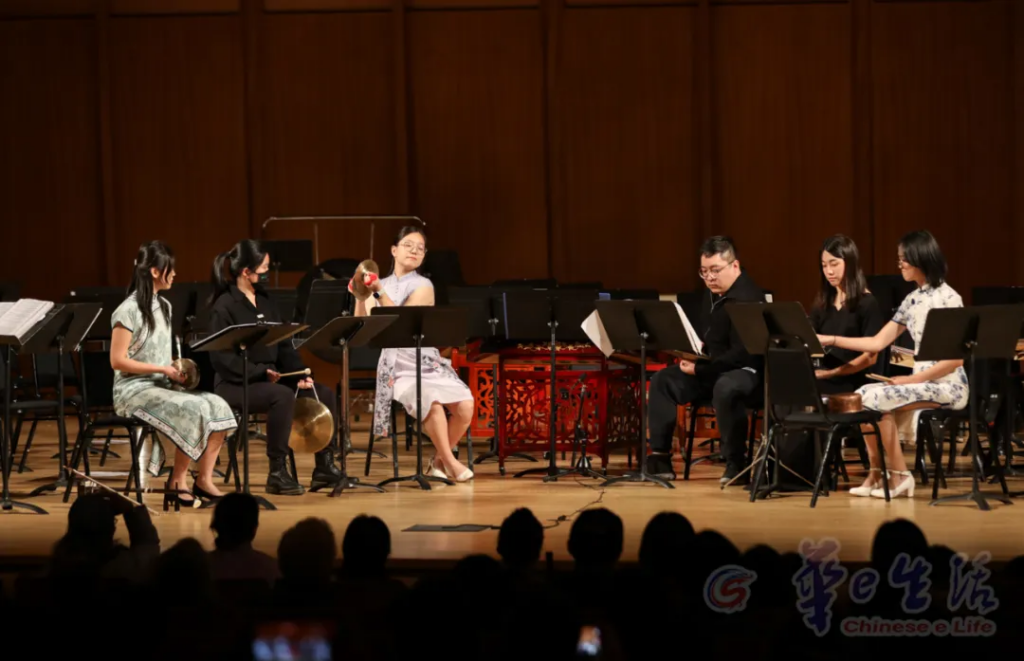
Chinese Music Ensemble
■By Celia Chen Nov. 16, 2024
The audience fills under the domed ceiling of Duke University’s Baldwin Auditorium, murmuring in wait as musicians of the Duke Chinese Music Ensemble take their place on stage.
Some wear embroidered qipaos and tangzhuangs embroidered with intricate designs. As the lights dim to a soft glow, musicians ready a collection of instruments including violins and basses but also pipas with pear-shaped bodies, erhus with long necks, and guzhengs with twenty-one strings. Lilting music drifts lightly over the audience, introducing the first piece, 步步高 (Onward and Upward), a traditional Cantonese folk song.
The music gradually brings a sense of awakening to the audience as it crescendos to become energetic and lively. Following is a diverse selection of music from multiple provinces and ethnic groups throughout China. Some pieces bring a sense of joy while others bring a sense of longing and pensiveness. 鸭子拌嘴 (Bickering Ducks) is performed as actors act as a group of clamoring ducks.
Throughout the night, musicians pull bows across their instruments and guzheng and pipa players move their hands in a flowing pattern over their instruments as if weaving a tapestry of music. The sound of the erhu and tambourine brings an almost bird-like melody to the stage. Guest musicians Lisa (Qi) Li, a pingtan opera performer, and Yuan Ni, an Erhu soloist masterfully perform their specialties.
The night successfully concludes with 瑶族舞曲 (Dance of the Yao People), with a blend of reflective and lively music met by tumultuous applause. In between each piece, a musician gives a story of personal connection or origin, bringing insight to the audience.
This performance, open without charge to the public, introduces a unique and perhaps new experience. Jennifer Chang, the director of the Duke Chinese Music Ensemble and masterguzheng player of this workshop open to the Duke community wants to continue to share Chinese music with the community. Come to experience more unique and extraordinary Chinese music.
The next concert of the ensemble is on April 13th of next year, featuring classical, folk, and opera themes! The ensemble is also seeking Chinese instruments to expand its offerings—if you or someone you know has an instrument to contribute, please reach out to the ensemble directly.
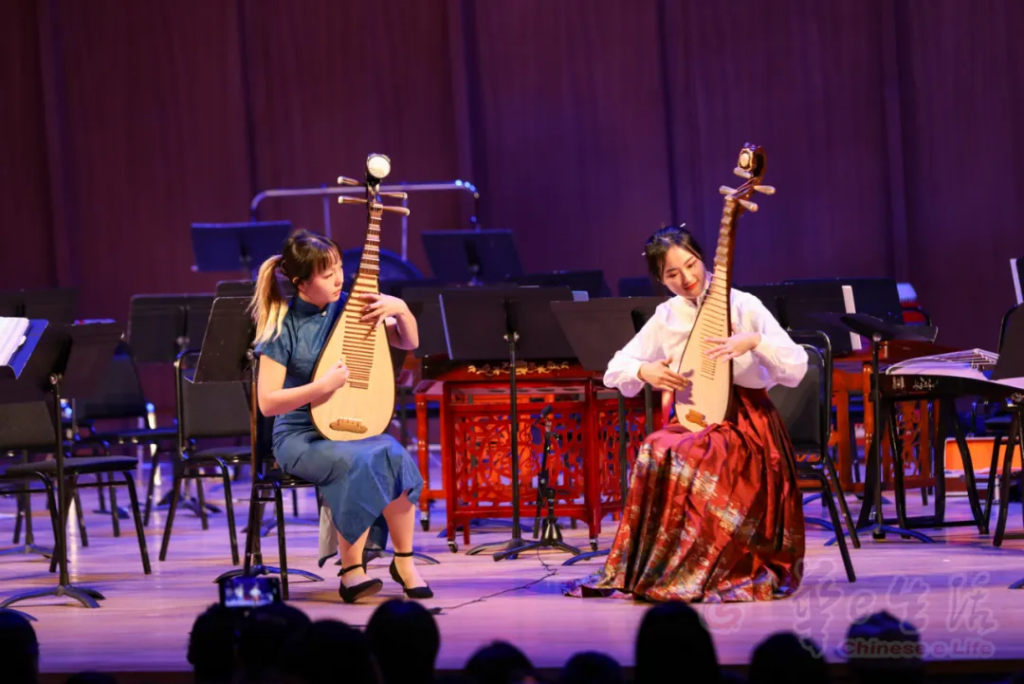
杜克大学中国音乐合奏课
■作者:陈语砚
2024年11月16日
在杜克大学鲍德温礼堂圆顶天花板下,观众逐渐入座,低声交谈,等待着杜克大学中国音乐合奏团的音乐家们走上舞台。
一些音乐家身着刺绣精美的旗袍或唐装。当灯光渐渐变暗,舞台上呈现柔和的光晕时,乐手们准备好了一系列乐器,包括小提琴、低音提琴,以及梨形的琵琶、长颈的二胡和拥有二十一根弦的古筝。悠扬的音乐缓缓飘荡在观众之间,开启了第一首乐曲《步步高》(Onward and Upward),这是一首传统的广东民间歌曲。
音乐逐渐由平缓的节奏过渡到激昂而充满活力的旋律,唤醒了听众的感官。随后的曲目涵盖了来自中国多个省份和民族的多样音乐作品。有些曲目充满欢快之情,而另一些则唤起了观众的思乡与沉思之感。《鸭子拌嘴》(Bickering Ducks) 的演出更是别出心裁,通过演员的表演生动再现了一群吵闹鸭子的景象。
整场演出中,乐手们用弓在乐器上拉出优美的旋律,古筝和琵琶演奏者的双手在乐器上流畅地拨动,仿佛在织就一幅音乐的锦缎。二胡和手鼓的结合则营造出几近鸟鸣的清脆旋律。特邀嘉宾Lisa Li,一位评弹表演艺术家,以及二胡独奏家倪媛,则分别展现了她们的绝技,技惊四座。
演出在《瑶族舞曲》(Dance of the Yao People)中圆满落幕,这首曲目融合了深沉与欢快的旋律,赢得了观众雷鸣般的掌声。在每一首乐曲之间,演奏者还会分享与乐曲相关的个人故事或背景,给予观众更深入的理解和体会。
本次演出免费向公众开放,为观众带来了一次独特甚至可能是全新的体验。杜克大学中国音乐合奏课的导演兼古筝演奏家常筱峥表示,她希望通过这个面向杜克社区的音乐工作坊,将中国音乐分享给更多的人。欢迎大家前来体验更独特而非凡的中国音乐。
合奏音乐会的下一场演出将在明年4月13日举行,主题涵盖经典、民间和戏曲音乐!此外,合奏课正在寻求更多中国传统乐器来扩充演出内容——如果您或您的朋友拥有可以捐赠的乐器,请直接联系我们转交。
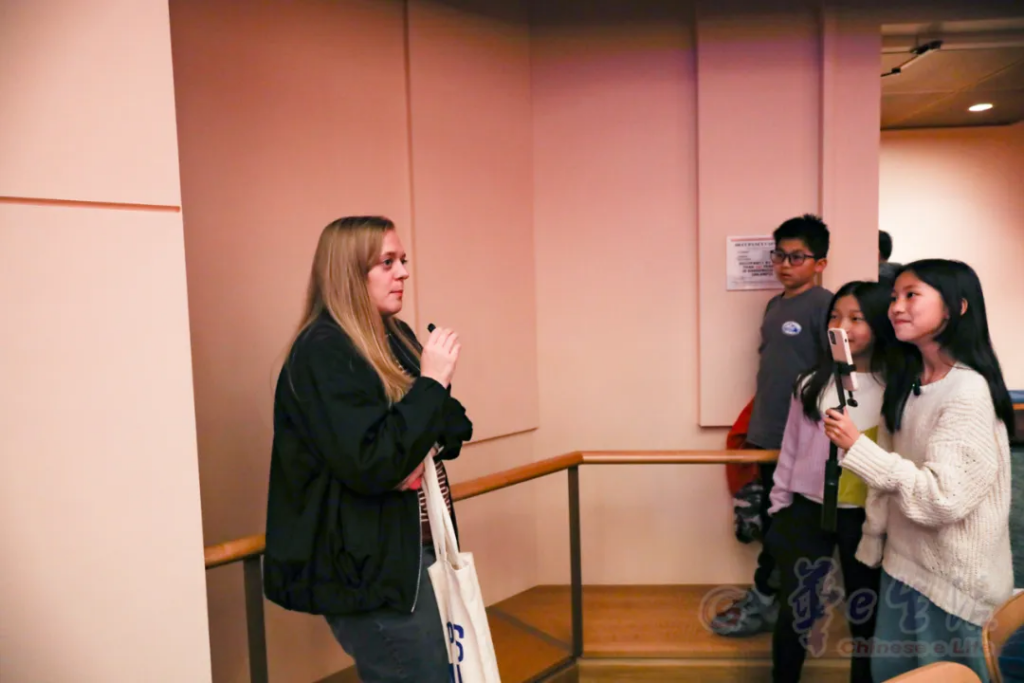
小记者们采访观众
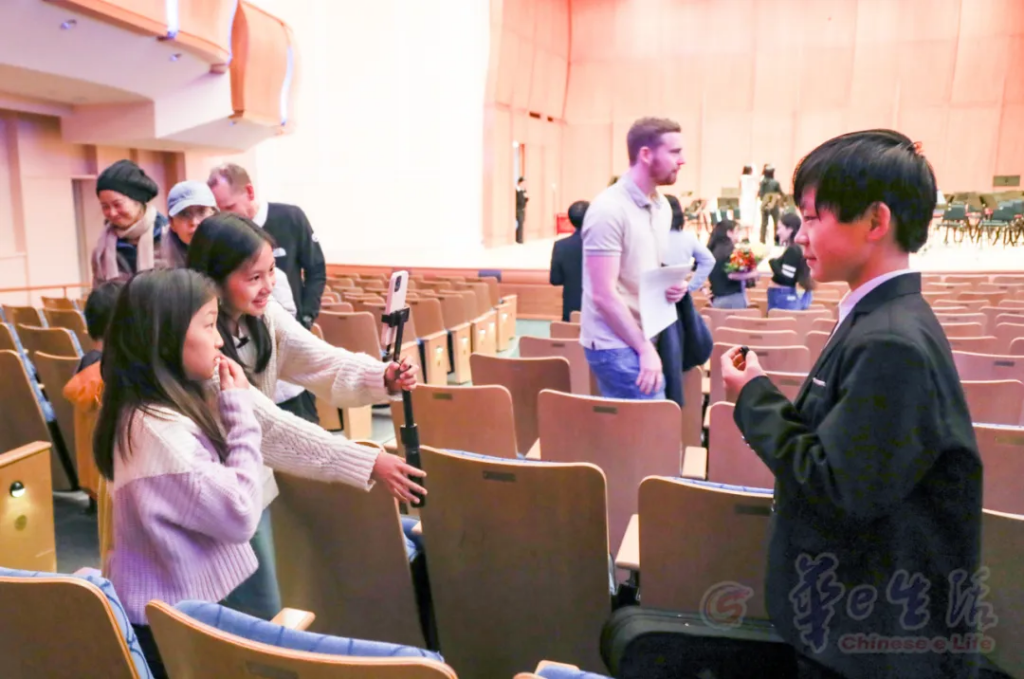
小记者们采访唐子傅
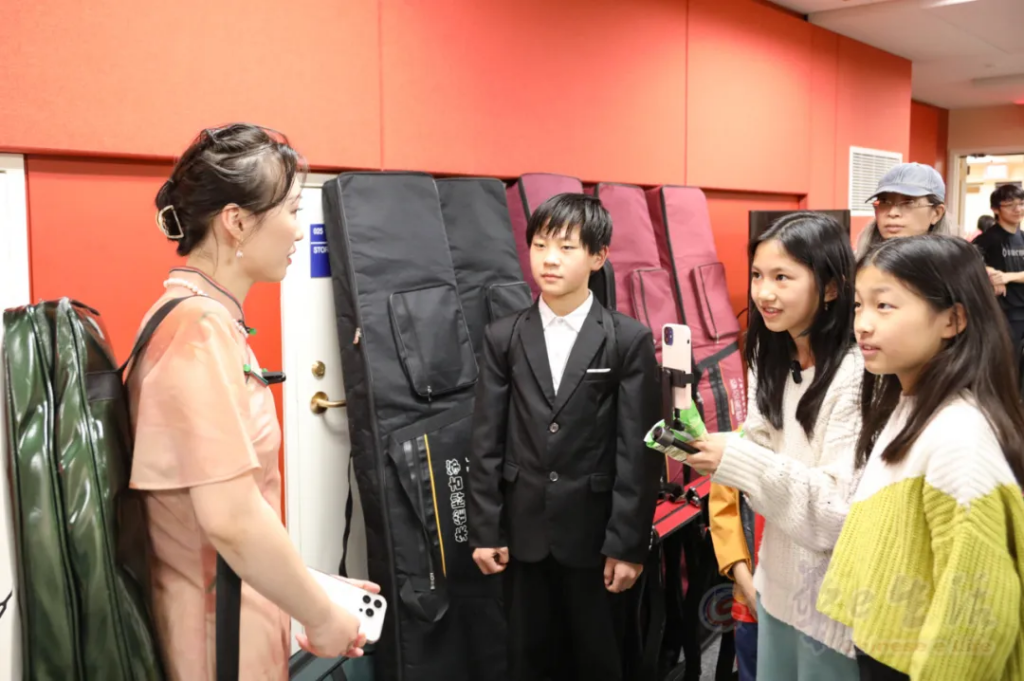
小记者们采访倪媛




